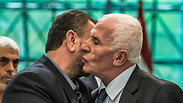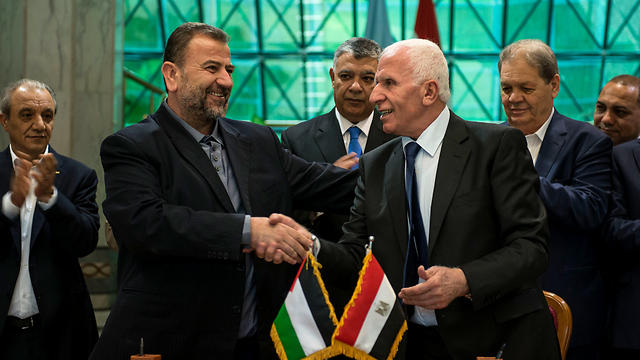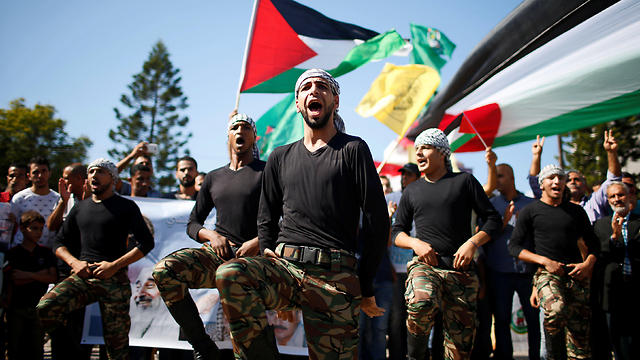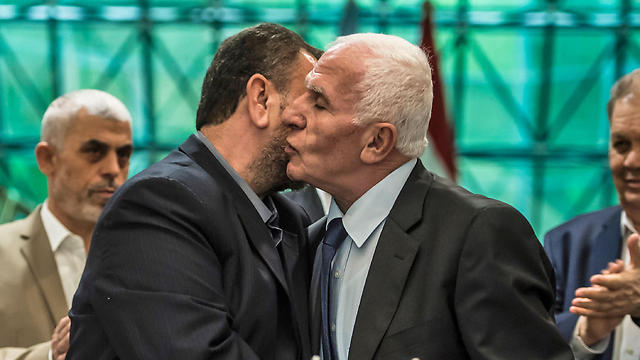
The holes in the Palestinian reconciliation agreement
Hamas and Fatah sign an agreement in which a unity government will seize control of Gaza, but many questions—most of which essential for the agreement's success—remain unanswered: such as the disarmament of Hamas, an uncompromisable demand of both Fatah and Israel.
Those who want to properly analyze the third reconciliation agreement in the past six years between Fatah and Hamas signed Thursday in Cairo should do the opposite—that is, to examine everything that was not said in the speeches and what was not written in the final statement.
First, the two parties decided to start from the easy part of the reconciliation, perhaps even the easiest. They negotiated a way that the Palestinian unity government would return to govern the Gaza Strip, in addition to its functions in the West Bank. The parties decided that the unity government would seize control the Gaza Strip no later than the first of December. From this date, Palestinian Authority President Mahmoud Abbas will be responsible, through his prime minister and his ministers, for the strip's education, welfare, tourism and more. He will also take responsibility for electricity, road construction and sewage.
In addition, the PA will gain control over the crossings between the Gaza Strip, Israel and Egypt. The two crossings into Israel will be handed over to the unity government on the first of November, but those familiar with the situation know full well that the PA already controls the Erez and Kerem Shalom crossings without armed security personnel. Hamas has a slightly more remote outpost at the Erez crossing, and anyone who leaves the Gaza Strip and enters it must pass through it as well, through its officials and security personnel. So what will happen to that Hamas outpost? No one knows.
And what about the Rafah Crossing, which is considered the most significant of them all because it is the only real way for the residents of Gaza to exit the strip? It was agreed and declared today that the Palestinian Authority would also take control of it. However, the parties' announcement stated that due to its uniqueness and the need to renovate it in order to bring about its renewed operation, PA officials would not enter it on the date specified, November 21. So when would they? That too has no answer.
In the past two weeks, senior Fatah officials, led by President Abbas, have sworn that they will not accept a reconciliation agreement without full security control over the Gaza Strip. The Hezbollah model from Lebanon will not be accepted here, they said. The agreement was signed today, and the words "weapons", "military wing", "rockets", "Izz ad-Din al-Qassam Brigades" and "tunnels" were not mentioned at all. The reason for that is that Egypt wanted them to leave the biggest obstacle for later. So the agreement was signed and no one even spoke about the giant elephant in the room. It is not clear how long this silence will last.
Another question concerns Hamas' security forces—it is highly doubtful that they will merge with the Palestinian Security Services and the Palestinian National Security Forces, which have worked very hard in the last decade to create a reputation for themselves respected by all intelligence services in the world, including Israel. The resumption of the work of the paralyzed Palestinian parliament has not yet been discussed, and Hamas' demand for new elections for PA presidency has suddenly ceased. And will the Palestinian Authority stop arresting Hamas operatives in the West Bank?
All the mines that were difficult to dismantle, the rival parties—apparently due to Egypt's demand—chose to set aside. But these obstacles will not disappear and they are what ultimately led to the failure of the other agreements of reconciliation in the past. The Palestinian public is fed up with declarations and celebrations, and it seems that this time, alongside the dances, there is a great deal of criticism and suspicion about the chances of success of the current agreement. Will the agreement remain in writing and not in practice? Will it be stopped by the civil administration of Gaza and then shelved? One thing is clear—it is full of holes, and raises too many pertinent questions.
Azzam al-Ahmad, the senior Fatah official who signed the reconciliation agreement with the deputy Hamas leader Saleh al-Arouri, tried to show at the press conference that this time it would be different. "Abbas told us—do not return if you did not reach an agreement." So they reached an agreement, but it is not clear what it entails or what will come of it. They may hug, kiss and applaud but we have been here several times before.
Israel, meanwhile, intends to wait and examine the developments on the ground after the signing in Cairo. "Any reconciliation between the Palestinian Authority and Hamas must include compliance with international agreements and compliance with the conditions of the (Middle East) Quartet, primarily recognition of Israel and the disarmament of Hamas," reiterated Israeli officials. "Continuing to dig tunnels, manufacturing rockets and initiating terrorist attacks against Israel are contrary to Quartet conditions and US efforts to renew the political (peace) process."
"Israel demands the fulfillment of these conditions, as well as the immediate release of IDF soldiers Oron Shaul and Hadar Goldin, and the civilians Ibrahim Mengistu and Hisham al-Sayed, who are held by Hamas," they added. "As long as Hamas does not disarm and continues to call for the destruction of Israel, Israel considers it responsible for all acts of terrorism emanating from Gaza, and insists that the PA does not allow any outpost of Hamas, potentially used for terrorist activities, to remain within the PA's territories, as well as in Gaza, should the PA indeed assume responsibility for the strip.
"Israel will examine developments on the ground and act accordingly."













